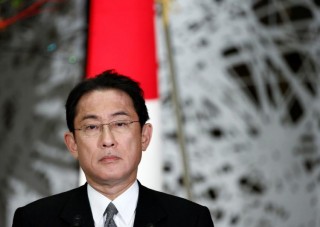Loading
Search
▼ Japan Vows to Ramp Up Efforts to Export Renewable Energy Technology
- Category:Other
TOKYO - Foreign Minister Fumio Kishida pledged Thursday that Japan will aggressively pursue the export of renewable energy technologies to tap into growth spurred via the worldwide transition to clean energy sources necessitated by the onset of climate change.
Emphasizing that energy demand will only grow in China and Southeast
Asia, Kishida noted in a message read to a symposium hosted by the ministry in Tokyo that "Japan's environmental technologies will greatly contribute to Asian nations' (transition)."
Calling climate change a "common challenge worldwide," Kishida noted that Japan is a signatory to the Paris Agreement, the global effort to reduce greenhouse gas emissions through member nations setting voluntary targets. The accord entered into force in November 2016.
In Fukushima, Japan is currently pursuing the production of hydrogen from renewable sources for use in fuel cells, part of a broader plan to help the prefecture rebuild from the March 2011 quake-tsunami disaster and nuclear accident.
"We will develop Japan's state-of-the-art technologies in energy-poor countries and regions and contribute to the improvement of energy security," Kishida added.
However, some analysts have voiced concern that Japan has lagged behind China and the United States in the production of renewable energy, with Prime Minister Shinzo Abe's government preferring to restart nuclear reactors under pressure from the business sector.
Economy, Trade and Industry Minister Hiroshige Seko has pushed the contentious idea that the cost of generating electricity from nuclear plants is lower than from any other source, including from renewables.
Parliamentary Vice Minister for Foreign Affairs Motome Takisawa read the message from Kishida at the symposium, the theme of which is energy security and investment in Asia.
© KYODO
Emphasizing that energy demand will only grow in China and Southeast
Asia, Kishida noted in a message read to a symposium hosted by the ministry in Tokyo that "Japan's environmental technologies will greatly contribute to Asian nations' (transition)."
Calling climate change a "common challenge worldwide," Kishida noted that Japan is a signatory to the Paris Agreement, the global effort to reduce greenhouse gas emissions through member nations setting voluntary targets. The accord entered into force in November 2016.
In Fukushima, Japan is currently pursuing the production of hydrogen from renewable sources for use in fuel cells, part of a broader plan to help the prefecture rebuild from the March 2011 quake-tsunami disaster and nuclear accident.
"We will develop Japan's state-of-the-art technologies in energy-poor countries and regions and contribute to the improvement of energy security," Kishida added.
However, some analysts have voiced concern that Japan has lagged behind China and the United States in the production of renewable energy, with Prime Minister Shinzo Abe's government preferring to restart nuclear reactors under pressure from the business sector.
Economy, Trade and Industry Minister Hiroshige Seko has pushed the contentious idea that the cost of generating electricity from nuclear plants is lower than from any other source, including from renewables.
Parliamentary Vice Minister for Foreign Affairs Motome Takisawa read the message from Kishida at the symposium, the theme of which is energy security and investment in Asia.
© KYODO
- July 19, 2017
- Comment (0)
- Trackback(0)


